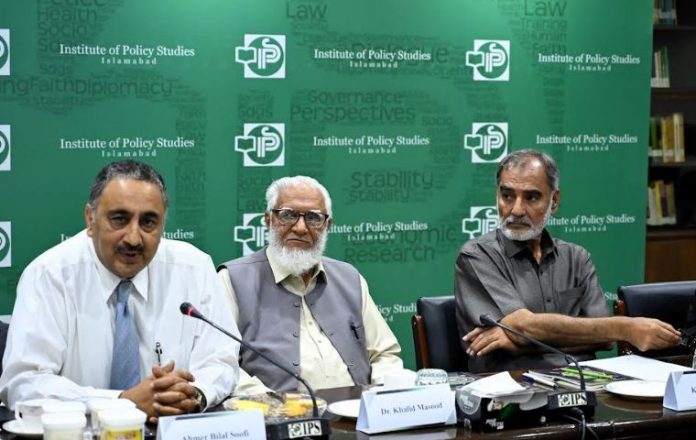DNA
ISLAMABAD, 10 May: Allah’s engagement with humans occurs through multiple tiers, each of which is a distinct covenant in its own right. Although the Quran is perceived as a religious text containing guidance for believers, a deeper exploration reveals that it embodies a unique contractual identity: a covenant between Allah and His creations.
This was discussed by Ahmer Bilal Soofi, a law expert and former federal law minister, during the launching ceremony of his book Quranic Covenants: An Introduction, organized by the Institute of Policy Studies (IPS) on April 24, 2024. The event brought together scholars, educators, and community members and featured a panel discussion that delved into the profound insights offered by Soofi’s exploration of the Quran’s structure and message.
The panel discussion, moderated by Syed Nadeem Farhat, research fellow IPS, was chaired by Honorable Justice Dr Khalid Masood, Supreme Court of Pakistan, and joined by Khalid Rahman, chairman IPS, Ambassador (r) Syed Abrar Hussain, vice chairman IPS, Honorable Justice Syed Mohammad Anwer, and distinguished figures from various fields, including religious and legal scholars, university educators, and researchers.
In his introductory remarks, Soofi mentioned that there are numerous levels at which Allah connects with the believers and the non-believers, and each connection is a separate legal arrangement, encompassing both spiritual devotion and the universal order. In this regard, he emphasized the importance of delving into the Quran’s legal architecture, noting its relative underexposure in existing scholarship. He said his work aims to bridge this gap and deepen the comprehension of the Quran’s significance in religious and societal contexts.
Soofi’s work presents a fresh perspective on the Holy Quran, framing it as a covenant or contractual framework between Allah and His creations. This perspective unveils multiple layers of engagement within the Quran, enriching both individual spiritual experiences and understanding of societal governance.
The research presented in this work holds dual significance. Firstly, it underscores the Quran’s central role as a religious text and as a foundation for socio-cultural and legal systems worldwide.
Understanding its structure and underlying message is crucial for navigating these systems effectively.
Secondly, such exploration of the Quran as a contractual framework offers a fresh perspective that enriches understanding of its message. This work aims to foster a stronger connection between believers and their faith by investigating whether the Quran’s structure embodies a unique contractual identity.
The research also delves into the broader implications for the governance of society and the state, emphasizing the importance of internalizing the sanctity of contracts as a fundamental belief. By regarding contracts as articles of faith, individuals are more likely to voluntarily adhere to both private and legislative agreements. It was underscored that promoting this narrative among Muslim scholars and religious leaders could lead to a significant shift in societal paradigms.
In conclusion, Khalid Rahman observed that Soofi’s book offers a compelling examination of the Quran’s legal framework, promising to reshape how the holy scripture is perceived and interacted with while bridging scholarly divides and offering fresh insights.

















